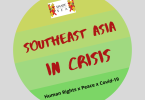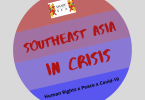Sophea TryStudent, Asia Pacific MA Human Rights and DemocratisationGlobal Campus of Human Rights Asia PacificInstitute of Human Rights and Peace Studies, Mahidol University
 At the beginning of April, Singapore reported only about 1,000 Covid-19 cases. One month later, more than 20,000 cases have been detected, thus putting this country in the first rank with the highest number of confirmed cases in the region (Worldometers, 2020). The majority of cases linked to work permit holders who are living among 43 dormitories across the country.Control measures have been implemented such as an order for all workers living in the dormitories to stop working and imposing a stay-at-home order. About 300,000 foreign workers working in the low skill sectors, including construction and other manufacturing sectors, have been put under movement restrictions within their dormitory complex, where task forces have been employed to monitor the situation (Ratcliffe, 2020).Recognizing that foreign workers play a crucial role in the economy, Prime Minister Lee Hsien Loong, on 10 April, announced that the government would assure the health and well-being of foreign workers in the country (Huaxia, 2020). However, the government ™s assurance is doubtful when Josephine Teo, Manpower Minister, in her released statement mentioned that Our priority is to protect the livelihoods of Singaporeans. That remains so even as a new battlefront emerged. Equally important now is to take care of our migrant workers ™ health (MOM, 2020).This reflects that marginalized groups like migrant workers may not be able to be included in the national policies of the country, or at least these populations may not be in the top priorities. Instead of providing supports directly to foreign workers, the Singaporean government has provided levy waivers and rebated to employers, so that employers can perform their obligations toward their foreign workers (MOM, 2020). This strategy shifts the responsibility of workers ™ salaries and basic needs during this pandemic to employers. While employers are also facing economic hardship, they are likely to deduct the salaries, thus the government should not assume that they will help foreign workers. Besides this, the policies ensure that affected workers still receive their salaries as a period of quarantine; however, it is unclear whether the salaries will be deducted to pay for their food and other needs during the isolation. For workers who live outside the quarantine dormitories, they are likely to fall through the crack.In the past few months, Singapore has been recognized and praised by many countries both regionally and globally for its efficiency in controlling the infection through contact-tracing and containment measures. The responses are taken by the government “while successfully containing the spread among local people leave thousands of foreign workers and other non-citizens behind. As a developed country with a high standard in the health system, Singapore now faces the challenge of curbing the outbreak among the community of foreign workers. The spark increase in Singapore is a lesson for its neighboring countries that continuously host a high number of migrant workers, for instance, Thailand and Malaysia.The virus does not discriminate; neither should policies created to suppress Covid-19. The government should take immediate action to prevent and minimize infection numbers. Inevitably, the majority of low-paid migrants remain vulnerable to infection due to their working and living condition. Instead of locking down the compound, the government needs to provide better sanitation and limit the number of workers staying together. Empty schools or buildings can be used as isolation places for foreign workers. While preventive measures must be taken into practice, there is an urgent need for inclusion of migrants in the response and recovery efforts as well.There is an urgent need for inclusion and non-discriminatory access for migrant workers into state services, particularly for the public health service. The inclusive approach in the health system would help to minimize the spread of the virus. The government must ensure that the test could be reached and made available and accessible to both citizens and non-citizens. At the same time, the government needs to take steps to reduce the economic impact of the outbreak. It has to ensure that employers who receive resettlement funds or loans comply are obliged to provide support to migrant workers.The government can work together with NGOs or community networks to monitor and mitigate risks associated with human mobility in affected areas. Community engagement is crucial at this moment as it could help migrant workers to adjust for community perceptions, beliefs, and practice. The state needs to ensure that the official information, health service information, and announcement of the policies can be reached to workers in the way they understand.Community spreading as the new wave of the virus could lead to the fear among workers themselves as well as the discrimination and negative sentiment against these marginalized populations. Before sympathy turns into anger among local people, the state shall include everyone within the territory in its national prevention, response plans, and interventions.References:
At the beginning of April, Singapore reported only about 1,000 Covid-19 cases. One month later, more than 20,000 cases have been detected, thus putting this country in the first rank with the highest number of confirmed cases in the region (Worldometers, 2020). The majority of cases linked to work permit holders who are living among 43 dormitories across the country.Control measures have been implemented such as an order for all workers living in the dormitories to stop working and imposing a stay-at-home order. About 300,000 foreign workers working in the low skill sectors, including construction and other manufacturing sectors, have been put under movement restrictions within their dormitory complex, where task forces have been employed to monitor the situation (Ratcliffe, 2020).Recognizing that foreign workers play a crucial role in the economy, Prime Minister Lee Hsien Loong, on 10 April, announced that the government would assure the health and well-being of foreign workers in the country (Huaxia, 2020). However, the government ™s assurance is doubtful when Josephine Teo, Manpower Minister, in her released statement mentioned that Our priority is to protect the livelihoods of Singaporeans. That remains so even as a new battlefront emerged. Equally important now is to take care of our migrant workers ™ health (MOM, 2020).This reflects that marginalized groups like migrant workers may not be able to be included in the national policies of the country, or at least these populations may not be in the top priorities. Instead of providing supports directly to foreign workers, the Singaporean government has provided levy waivers and rebated to employers, so that employers can perform their obligations toward their foreign workers (MOM, 2020). This strategy shifts the responsibility of workers ™ salaries and basic needs during this pandemic to employers. While employers are also facing economic hardship, they are likely to deduct the salaries, thus the government should not assume that they will help foreign workers. Besides this, the policies ensure that affected workers still receive their salaries as a period of quarantine; however, it is unclear whether the salaries will be deducted to pay for their food and other needs during the isolation. For workers who live outside the quarantine dormitories, they are likely to fall through the crack.In the past few months, Singapore has been recognized and praised by many countries both regionally and globally for its efficiency in controlling the infection through contact-tracing and containment measures. The responses are taken by the government “while successfully containing the spread among local people leave thousands of foreign workers and other non-citizens behind. As a developed country with a high standard in the health system, Singapore now faces the challenge of curbing the outbreak among the community of foreign workers. The spark increase in Singapore is a lesson for its neighboring countries that continuously host a high number of migrant workers, for instance, Thailand and Malaysia.The virus does not discriminate; neither should policies created to suppress Covid-19. The government should take immediate action to prevent and minimize infection numbers. Inevitably, the majority of low-paid migrants remain vulnerable to infection due to their working and living condition. Instead of locking down the compound, the government needs to provide better sanitation and limit the number of workers staying together. Empty schools or buildings can be used as isolation places for foreign workers. While preventive measures must be taken into practice, there is an urgent need for inclusion of migrants in the response and recovery efforts as well.There is an urgent need for inclusion and non-discriminatory access for migrant workers into state services, particularly for the public health service. The inclusive approach in the health system would help to minimize the spread of the virus. The government must ensure that the test could be reached and made available and accessible to both citizens and non-citizens. At the same time, the government needs to take steps to reduce the economic impact of the outbreak. It has to ensure that employers who receive resettlement funds or loans comply are obliged to provide support to migrant workers.The government can work together with NGOs or community networks to monitor and mitigate risks associated with human mobility in affected areas. Community engagement is crucial at this moment as it could help migrant workers to adjust for community perceptions, beliefs, and practice. The state needs to ensure that the official information, health service information, and announcement of the policies can be reached to workers in the way they understand.Community spreading as the new wave of the virus could lead to the fear among workers themselves as well as the discrimination and negative sentiment against these marginalized populations. Before sympathy turns into anger among local people, the state shall include everyone within the territory in its national prevention, response plans, and interventions.References:
- Huaxia, 2020. Singaporean PM Promises to Take Care of Foreign Workers. Xinhua, 10 April. Available at: <http://www.xinhuanet.com/english/2020-04/10/c_138965033.htm> .
- Ratcliffe, Rebecca, 2020. Singapore ™s Cramped Migrant Worker Dorms Hid Covid-19 Surge Risk. The Guardian, 17 April. Available at: <https://www.theguardian.com/world/2020/apr/17/singapores-cramped-migrant-worker-dorms-hide-covid-19-surge-risk> .
- Sim, Dewey, 2020. Singapore Records 942 New Coronavirus Cases, Surpassing Malaysia’s Total. The South China Morning Post, 18 April. Available at: <https://www.scmp.com/week-asia/health-environment/article/3080539/singapore-records-942-new-coronavirus-cases-taking-its> .
- Worldometers, 2020. Singapore: Coronavirus Cases. Worldometers, 04 May. Available at: <https://www.worldometers.info/coronavirus/country/singapore/> .
- Ministry of Manpower (MOM), 2020. Ministerial Statement by Mrs. Josephine Teo, Minister for Manpower, 4 May 2020. Available at: <https://www.mom.gov.sg/newsroom/parliament-questions-and-replies/2020/0504-ministerial-statement-by-mrs-josephine-teo-minister-for-manpower-4-may-2020> .





